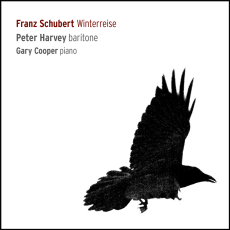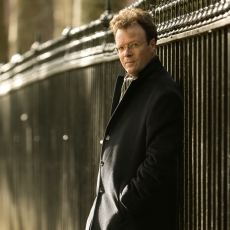Peter Harvey - Winterreise - International Record Review
In any performance of Winterreise, Schubert's masterpiece of desolation, the way in which the first song is delivered is likely to be a strong indication of what is to come. Peter Harvey and his accompanist Gary Cooper give ‘Gute Nacht', the wanderer's miserable farewell to his love as he sets out into the darkness and the snow, exactly the right combination of grief and resignation. Their slow tempo suggests the heavy trudge of the reluctant traveller, Harvey's rich, true baritone voice is full of sorrow, and the steady bleakness of Cooper's touch on the fortepiano, a copy of an 1823 Brodmann made by David Winston, is like an appropriately frozen version of the sound of a modern piano.
The promise of this first song is mostly fulfilled in what follows, although the vehemence of Cooper's accompaniment of ‘Der Wetterfahne' and both ‘Erstarrung' and ‘Rückblick', taken too fast for clarity, almost overwhelms the lover's fury at the greed of the parents who have sent him packing - ‘ihr Kind ist eine reiche Braut' (‘their child is a rich bride') - and the pathos of his resolution to keep the image of his beloved frozen in his frozen heart.
Harvey's intelligent sensitivity to the words of Müller's poems makes this an unusually thoughtful Winterreise, as if the rejected lover were gradually realizing, as he plods across the winter landscape, the depths of his despair. In ‘Gefrorne Tränen', with the staccato teardrops of the accompaniment falling one by one, Harvey sings as if really surprised that his burning breast can produce tears cold enough to freeze. In ‘Auf dem Flusse', he is stricken with horror, as the listener is, by the likeness between his grief and the river raging silently under its frozen surface. In ‘Der greise Kopf' his astonishment that his hair, although white by ‘dieser ganzen Reise', ‘this whole journey', pulls the listener into the sadness of Schubert's setting with unusual force. Accompanying these icy songs, Cooper's fortepiano sounds chillingly bleak.
The cycle's most demanding songs, of love remembered from loss, ‘Der Lindebaum', ‘Frühlingstraum' and ‘Die Nebensonnen', are a searching test of any singer's vocal and emotional resources. Harvey gives beautiful, perceptive performances of all three, negotiating with poignant musicality the contrasts, in ‘Der Lindenbaum', between old promise and new resolve, and in ‘Frühlingstraum' between the deceptive sweetness of dream, harsh reality and quiet, hopeless reverie. The fortepiano gives the plangent unreality of a musical box to the tune accompanying the dream. Both Harvey and Cooper produce a subtle performance of the difficult ‘Die Nebensonnen', the wanderer rapt in the shock of seeing three suns, and longing, like Keats, for ‘easeful death', and also of ‘Das Wirtshaus', taken slowly, with the possibility of rest at last in the graveyard denied to the weary traveller.
As bother Müller's poems and Schubert's music gather emotional density and poetic distance towards the end of the cycle, Harvey's singing almost never fails to register the complexity of the songs. Both performers give a relentless but well-judged account of the very fine ‘Der Wegweiser', the ominous repeated notes in the accompaniment taking the singer steadily towards death, on the road he must follow ‘die noch keiner ging züruck', ‘from which no traveller returns'. Cooper's interpretation, however, falters here and there. The last leaves of autumn falling randomly in the accompaniment to ‘Letzte Hoffnung' are too emphatically played, and, although the tempo and Harvey's vocal line are suitably trance-like for ‘Die Krähe', the song is destructively softened by Cooper's overdone pedal, which gives a clinging sentimentality to the circling crow. Worse still, the dereliction of the last, wonderful song, ‘Der Leiermann', in which the hurdy-gurdy man, the only other human being in the cycle, grinds out his little tune neglected in the cold, is sweetened and ruined by the pedal, when this, of all songs, should be most suited to the fortepiano's plain simplicity.
This is an engaging and draining Winterreise, much to be recommended for the quality of Harvey's singing, despite the performance's occasional roughness at the edges and one or two serious lapses in the accompaniment. The fine acoustic, that of a church, St Martin's, East Woodhay, where the recording was made, is both intimate and slightly resonant. A very good booklet note by Peter Harvey himself, who has freshly translated Müller's poems into clear, accurate English, does not need the further, rather ponderous note by Adam Binks.


